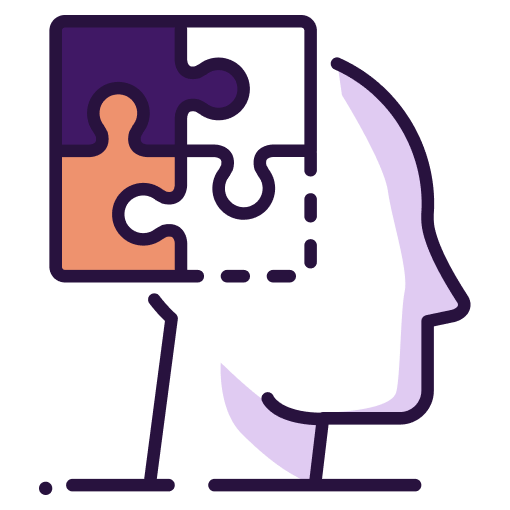Dissociation
Understanding, Causes, Symptoms & Treatment Options
What is Dissociation?
Dissociation is often associated with trauma and can serve as a survival mechanism to protect individuals from overwhelming emotions or experiences. It can occur in response to various forms of trauma, including childhood abuse, combat exposure, accidents or natural disasters.
Symptoms of Dissociation

Depersonalization
Feeling detached from oneself, as if observing from outside the body, or experiencing a sense of unreality about one’s own thoughts, emotions or physical sensations.

Derealization
Perceiving the external world as unreal, distorted or unfamiliar. It may involve a sense of detachment from one’s surroundings, feeling like in a dream-like state, or objects appearing distorted or unreal.

Amnesia
Gaps or loss of memory for specific events, periods of time or personal information that is not attributable to ordinary forgetfulness. Individuals may have difficulty recalling important aspects of their lives or traumatic experiences.

Identity Alteration
In Dissociative Identity Disorder (DID), individuals may have distinct identities or personality states, each with its own unique way of perceiving and relating to the world, memories and behaviors.

Emotional Numbing
Feeling disconnected from emotions or experiencing a restricted range of emotions. Some individuals may have difficulty identifying or expressing their feelings.

Identity Confusion
Uncertainty or confusion about one’s identity, self-image or personal values. It may involve feeling like different parts of oneself are in conflict or not integrated.

Time Loss
Periods of time that are unaccounted for, where individuals cannot remember what happened during that time.

Sensory Disruptions
Changes in sensory perception, such as feeling numbness or tingling, experiencing time distortion or perceiving sounds, colors or sensations differently.

Flashbacks
Vivid recollections or re-experiencing of traumatic events as if they were happening in the present moment.
Causes of Dissociation
Trauma
Dissociation is frequently associated with trauma, particularly in situations where individuals experience intense or prolonged physical, emotional or sexual abuse during childhood or adulthood. Traumatic events, such as accidents, natural disasters or combat exposure, can also be a trigger.
Childhood Abuse & Neglect
Early experiences of neglect, physical or emotional abuse, or chaotic family environments can disrupt the normal development of attachment bonds and contribute to dissociation as a coping mechanism.
Adverse Childhood Experiences (ACEs)
Developmental Factors
Psychological Defense Mechanism
Genetic & Biological Factors
Co-Occurring Mental Health Conditions
Dissociation can be associated with other mental health conditions, such as post-traumatic stress disorder (PTSD), borderline personality disorder (BPD) or anxiety disorders.
It’s important to recognize that individuals may respond differently to similar experiences, and not everyone who experiences trauma will develop dissociation. Factors such as resilience, support systems and individual coping strategies can also influence the occurrence and severity of dissociative symptoms.
Treatment Options for Dissociation

Trauma-Focused Therapy
Therapies specifically designed to address trauma, such as Trauma-Focused Cognitive-Behavioral Therapy (TF-CBT), Eye Movement Desensitization and Reprocessing (EMDR) or Prolonged Exposure Therapy (PE), can help individuals process and integrate traumatic memories, reduce distressing symptoms and develop healthier ways of coping.

Dissociation-Focused Therapy
This therapy approach focuses specifically on addressing dissociation. It aims to help individuals understand and manage dissociative symptoms, increase awareness of triggers and develop grounding techniques to stay connected to the present moment.

Internal Family Systems (IFS)
IFS is an approach that explores the internal parts of an individual’s psyche and aims to develop a harmonious relationship among these parts. It can help individuals identify and work with different aspects of themselves, promoting integration and reducing dissociative experiences.

Dialectical Behavior Therapy
DBT combines elements of cognitive-behavioral therapy with mindfulness practices. It can help individuals develop emotional regulation skills, distress tolerance, and interpersonal effectiveness, which are particularly beneficial for those with dissociation and related emotional dysregulation.

Psychodynamic Therapy
Psychodynamic therapy focuses on exploring the unconscious processes, early life experiences and relational patterns that contribute to dissociation. By increasing insight and understanding, individuals can work towards resolving underlying conflicts and integrating dissociated aspects of their experiences.


